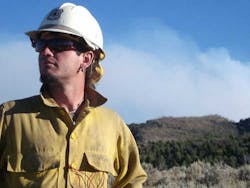NIOSH: Texas Wildland Firefighter's Death Preventable
SAN ANTONIO -- Hot shot federal firefighters called in to battle the toughest U.S. wildfires often avoid reporting symptoms of heatstroke because they fear damaging their professional reputations, said a report commissioned after an elite firefighter died in Texas last year.
The report, released on Wednesday as at least four blazes burned in Arizona early in this year's fire season, said the death of Caleb Hamm, 23, was of heatstroke, and recommended ways federal officials can better protect firefighters' lives.
Hamm, who was from Idaho, and was a member of the federal Bureau of Land Management's "Hot Shot" firefighting team, collapsed while working far away from colleagues to fight a brush fire that was threatening dozens of homes west of Fort Worth during the driest year on record in Texas.
On the day of his death, firefighters were working faster and with fewer breaks than normal, the report said.
"Some crewmembers believed that taking extra rest breaks might jeopardize future employment and assignments," the report by the National Institute for Occupational Safety and Health said.
It also said that interviews with Hot Shot firefighters revealed that they worry about being re-hired for the next fire season and do not report heatstroke symptoms "out of fear of discipline or reprisal, or out of fear of losing hard-earned credibility."
The report recommended the bureau develop strategies to address the job-security fears. It also called for reducing the length of shifts in which firefighters are directly exposed to high temperatures, requiring them to work in pairs, and more quickly summoning medical help when firefighters report heatstroke symptoms.
Just before he was found unresponsive, Hamm had reported that "he was hot and had a little headache," the report said.
When he was rushed to an ambulance, he had a rectal temperature of 108 Fahrenheit. Several members of Hamm's team had reported symptoms of heat-related illness, and one member of the team had vomited, the report said.
"These guys are elite - there is a macho culture within the organization," Hamm's aunt Sheryl McLain said in an interview on Wednesday from her home in Oklahoma City. "They are not the types of guys who whine or complain or ask for breaks."
The severity of Hamm's condition was rare. Federal records show he was only the second federal wildland firefighter to die of heatstroke, the report said.
Still, McLain said she hopes the report will "help keep Caleb's legacy alive" by preventing other Hot Shot firefighters from suffering the same fate.
"We hope the Bureau of Land Management takes these recommendations seriously, so another family won't have to walk through the nightmare that we are continuing to walk through," she said.
(Editing by Corrie MacLaggan, Cynthia Johnston and Lisa Shumaker)
